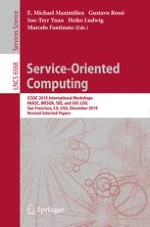2011 | Buch
Service-Oriented Computing
ICSOC 2010 International Workshops, PAASC, WESOA, SEE, and SOC-LOG, San Francisco, CA, USA, December 7-10, 2010, Revised Selected Papers
herausgegeben von: E. Michael Maximilien, Gustavo Rossi, Soe-Tsyr Yuan, Heiko Ludwig, Marcelo Fantinato
Verlag: Springer Berlin Heidelberg
Buchreihe : Lecture Notes in Computer Science
